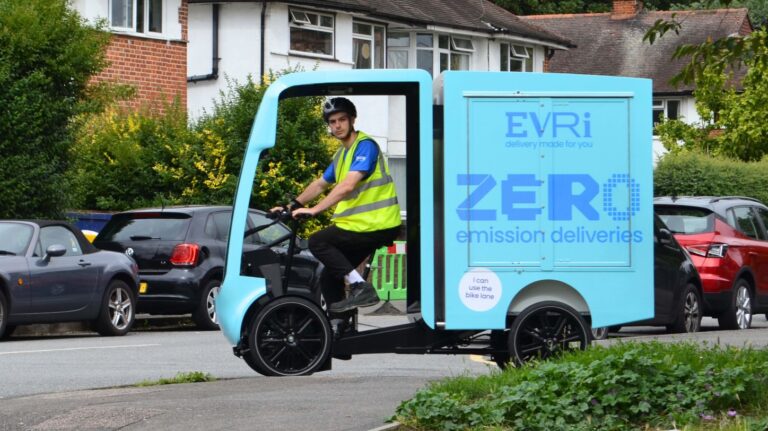Parcel delivery company Evri has continued its nationwide rollout of e-cargo bikes with the introduction of 15 new bikes at its Wimbledon depot.
Having already started using e-cargo bikes in Bristol, Edinburgh, and Manchester, the new additions in Wimbledon are part of Evri’s commitment to “triple its parcel deliveries by e-cargo bikes to over 500,000 within the next year”.
Evri’s wider sustainability strategy outlines plans to “reach net-zero in direct and indirect carbon emissions by 2035”, expecting the replacement of vans with cargo bikes – in some instances – to contribute towards meeting this goal.
It partnered with Zoomo to bring the new vehicles to its Wimbledon depot, taking advantage of the electric bike specialist’s new vehicle-as-a-service offering. The bikes themselves, manufactured by EAV, have a cargo volume of 2,000 litres and a 170kg payload, with 2m³ of cargo space.
Nancy Hobhouse, Head of ESG at Evri, said: “Research shows that e-cargo bikes deliver goods 60% faster than vans in city centres while reducing carbon emissions by 90% compared to diesel vans and one-third compared to electric vans. Partnerships like this are an important step forward as we continue to trial alternative fuels and innovative ways of delivering in the final mile.”
Zoomo’s co-founder and Chief Revenue Officer, Michael Johnson, added: “Making the switch to e-cargo bikes for commercial fleets is still in its early days, but there is a clear business case.
“By teaming up with Evri and unleashing the power of EAV cargo bikes, we’re making big strides in removing fossil fuel vans from our city streets. Together, we are driving the shift towards a greener and more efficient last-mile delivery ecosystem.”
Adopting e-cargo bikes as a last mile delivery solution has become increasingly popular in recent years, with data from the Bicycle Association showing a 37% increase in e-cargo bike sales from May 2021 to May 2022. These types of vehicle are now fairly common within the fleets of major third-party logistics companies, from cargo bikes to e-walkers, as they work towards reaching their sustainability targets through their supply chain.
If you haven’t already, make sure to check out the morning and afternoon highlights from Logistics Manager’s Sustainable Supply Chain Conference, which saw experts in the field discussing what companies are doing to improve sustainability within their supply chains.
Following the recent ULEZ expansion in London, it would be fair to assume that more light last-mile delivery vehicles like these will be seen on the UK’s streets, especially in the capital.
Cargo bikes, despite their obvious environmental benefits, have been the subject of debate recently, with some calling for greater health and safety conditions for workers riding these vehicles. A report by the University of Westminister concluded, after conducting interviews with 15 different cargo bike companies, that the cargo bike sector in its current state poses financial and health risks to many riders.
Dr Ersilia Verlinghieri, Senior Research Fellow at the University of Westminster and Lead Researcher on the project, said: “Cargo bikes can provide a reliable alternative to van deliveries, and they contribute to reducing greenhouse gas emissions, air pollution and improving public space. But this sector can truly thrive only if it centres its growth on prioritising the health and wellbeing of its workers, rather than allowing commercial considerations to be the primary driver of decisions.”







